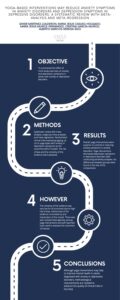In this blog, we will explain how we synthesised evidence regarding the effectiveness of mind-body exercises on anxiety or depression symptoms in people diagnosed with anxiety or depressive disorders. Our study (recently published in BJSM) was conducted by some of the team members of the Uncertainty, Mindfulness, Self, and Spirituality (UMSS) research group, Seville, Spain.
Why is this study important?
Most of us live in a society where sedentary habits and stressful tasks control our daily lives. This frenetic lifestyle could cause some of us to develop anxiety or depression symptoms, and in the worst cases, anxiety or depressive disorders could emerge. Multiple psychological interventions may be beneficial for anxiety and depressive disorders. In addition, the practice of exercise could permit these people to maintain an active lifestyle and improve other factors that may be beneficial for their mental health (e.g., social interactions). he popularity of mind-body exercises has increased in the last decade in Western countries. Different qigong, tai chi, and most commonly, yoga exercises are practised daily in nature, sports centres, or clinical settings. Many randomised clinical trials have been published to evaluate the effects of these exercises in different clinical and non-clinical populations, such as in people diagnosed with anxiety or depressive disorders.
How did the study go about this?
We summarised and critically analysed those randomised clinical trials that explored the effectiveness of qigong, tai chi, or yoga exercises in people diagnosed with anxiety or depressive disorders. To achieve our goal, we conducted a systematic review with meta-analysis and secondary analyses such as meta-regressions. Meta-analyses helped us to obtain a specific value about the relevance of mind-body exercises on anxiety and depression symptoms in the aforementioned health conditions. In addition, meta-regressions permitted us to observe if other factors could help to explain the effects that we found in meta-analyses.
What did the study find?
We found mainly that yoga exercises could reduce anxiety symptoms in people diagnosed with anxiety disorders. Moreover, we also found that these interventions could decrease depression symptoms in people diagnosed with depressive disorders, after conducting a sensitivity analysis where three studies were excluded. On the other hand, the evidence we analysed showed a lack of effects of tai chi or qigong exercises for anxiety or depression symptoms in these populations. Despite these results, we observed that the methodological quality of evidence supporting these findings is mostly very low.
For example, we suspected that some imprecisions could emerge due to the small number of participants included in many randomised clinical trials. Another methodological concern was related to the lack of application of the TIDieR checklist. This tool is helpful to show information health professionals could need to replicate clinical research in the clinical setting.
What are the key take-home points?
Although we have no certainty about the importance some specific yoga details (e.g., yoga style, dose of yoga sessions, individual vs group sessions), could play in people diagnosed with anxiety or depressive disorders, the practice of yoga, in general, could help them to reduce anxiety symptoms or depression symptoms, in case of anxiety or depressive disorders, respectively. Having said that, we cannot make sound recommendations due to the very low quality of the evidence that was analysed. Therefore, we encourage and recommend health professionals, people diagnosed with anxiety or depressive disorders, and the general audience interpret the findings of our study with caution since some important methodological issues were detected and discussed.

Author information
Javier Martinez-Calderon PhD a,b; Maria Jesus Casuso-Holgado PhD a,b; María Jesús Muñoz-Fernández PhD b,c; Cristina García-Muñoz PhD b,d *; Alberto Marcos Heredia-Rizo PhD a,b
a Departamento de Fisioterapia, Facultad de Enfermería, Fisioterapia y Podología, Universidad de Sevilla, 41009 Sevilla, Spain.
b Uncertainty, Mindfulness, Self, Spirituality (UMSS) Research Group, Sevilla, Spain.
c Department of Physiotherapy, University School Francisco Maldonado, 41640 Osuna, Sevilla, Spain.
d Department of Nursing and Physiotherapy, Faculty of Nursing and Physiotherapy, University of Cadiz, Cadiz, Spain.